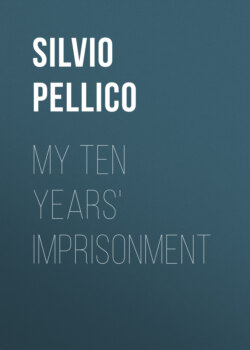Читать книгу My Ten Years' Imprisonment - Silvio Pellico - Страница 15
На сайте Литреса книга снята с продажи.
CHAPTER XI.
ОглавлениеTable of Contents
Along the same gallery, upon a level with my prison, I saw other prisoners passing and repassing the whole day to the place of examination. They were, for the chief part, of lowly condition, but occasionally one or two of better rank. All, however, attracted my attention, brief as was the sight of them, and I truly compassionated them. So sorrowful a spectacle for some time filled me with grief, but by degrees I became habituated to it, and at last it rather relieved than added to the horror of my solitude. A number of women, also, who had been arrested, passed by. There was a way from the gallery, through a large vault, leading to another court, and in that part were placed the female prisoners, and others labouring under disease. A single wall, and very slight, separated my dwelling from that of some of the women. Sometimes I was almost deafened with their songs, at others with their bursts of maddened mirth. Late at evening, when the din of day had ceased, I could hear them conversing, and, had I wished, I could easily have joined with them. Was it timidity, pride, or prudence which restrained me from all communication with the unfortunate and degraded of their sex? Perhaps it partook of all. Woman, when she is what she ought to be, is for me a creature so admirable, so sublime, the mere seeing, hearing, and speaking to her, enriches my mind with such noble fantasies; but rendered vile and despicable, she disturbs, she afflicts, she deprives my heart, as it were, of all its poetry and its love. Spite of this, there were among those feminine voices, some so very sweet that, there is no use in denying it, they were dear to me. One in particular surpassed the rest; I heard it more seldom, and it uttered nothing unworthy of its fascinating tone. She sung little and mostly kept repeating these two pathetic lines:—
Chi rende alla meschina
La sua felicità?
Ah, who will give the lost one
Her vanished dream of bliss?
At other times, she would sing from the litany. Her companions joined with her; but still I could discern the voice of Maddalene from all others, which seemed only to unite for the purpose of robbing me of it. Sometimes, too, when her companions were recounting to her their various misfortunes, I could hear her pitying them; could catch even her very sighs, while she invariably strove to console them: “Courage, courage, my poor dear,” she one day said, “God is very good, and He will not abandon us.”
How could I do otherwise than imagine she was beautiful, more unfortunate than guilty, naturally virtuous, and capable of reformation? Who would blame me because I was affected with what she said, listened to her with respect, and offered up my prayers for her with more than usual earnestness of heart. Innocence is sacred, and repentance ought to be equally respected. Did the most perfect of men, the Divinity on earth, refuse to cast a pitying eye on weak, sinful women; to respect their fear and confusion, and rank them among the minds he delighted to consort with and to honour? By what law, then, do we act, when we treat with so much contempt women fallen into ignominy?
While thus reasoning, I was frequently tempted to raise my voice and speak, as a brother in misfortune, to poor Maddalene. I had often even got out the first syllable; and how strange! I felt my heart beat like an enamoured youth of fifteen; I who had reached thirty-one; and it seemed as if I should never be able to pronounce the name, till I cried out almost in a rage, “Mad! Mad!” yes, mad enough, thought I.
